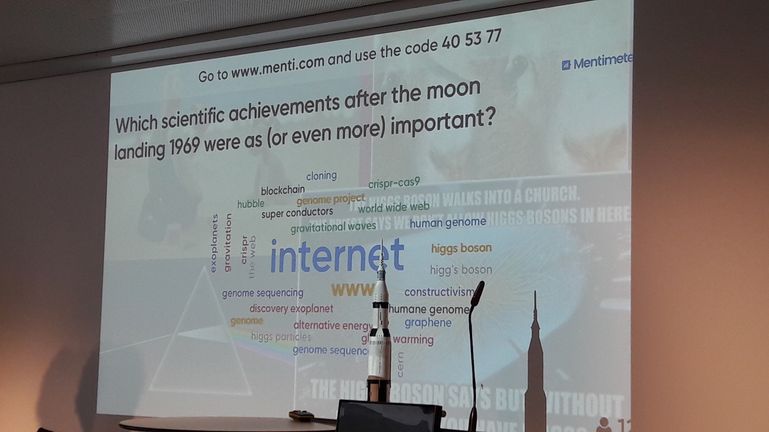2019 ALLEA Scientific Symposium: The afternoon
ALLEA, the European Federation of Academies of Sciences and Humanities, celebrated its 25th anniversary in Bern. On 9 May it was time for a scientific symposium about “Science and Society in Present-day Europe”, hosted and co-organised by the Swiss Academies of Arts and Sciences.
After the lunch break it as time for a musical intermezzo by the clarinet player Matthias Müller, professor at the Zurich University of the Arts. Than a welcome note by the mayor of Bern, Alec von Graffenried, followed. Modern Switzerland was founded in 1848 becoming an island for science, also in Bern. He mentioned the Annus Mirabilis for Physics 1905 with Albert Einstein’s important achievements and the first moon landing with an experiment from the University of Bern being the only non-US one.

Scientific achievements in the past ... and in the future?
For session 3 all seats were rearrange around tables so that the audience could get interactive. The session was dedicated to the 50th anniversary of the moon landing titled ‘Remember the Moon Landing 1969! Big Scientific Events and their Role in Society.’ Nicola Forster, President of Science et Cité, who led the session asked the audience: “Are you ready to play?” With audio and video recordings the audience was transported into the subject and also back into the time 50 years ago and then ready to answer some questions: What was the favourite band in 1969? Were you already born by then? How did you (or your parents) follow the first moon landing? The question “which scientific achievements after the moon landing 1969 were as (or even more) important” was the first to be discussed in groups and produced one big winner: the Internet. The next question “which coming scientific events and achievements will be of very high importance for humankind” was discussed even more and led to a lot of different answers. Ranking them put clean energy on the first place followed by artificial intelligence and fusion energy. And the groups were asked to discuss how scientific achievements should be communicated to society and media to ensure, that they will stay in the collective memory. Emotions were the top answer followed by schools and understandability.
Debate about micro- and nanoplastics
Finally, session 4 consisted of a panel debate that explored the close interaction and mutual influence between science, society and policymakers. The session took the example of the debate about micro- and nanoplastics, recently tackled by SAPEA in an evidence review report for the European Commission’s Chief Scientific Advisors. On the panel were Giulia Carlini, Staff Attorney at the Center for International Environmental Law; Nicole Grobert, member of the Group of Chief Scientific Advisors; Dilyana Mihaylova, Marine Plastics Project Manager at the NGO “Fauna & Flora International”; and Sabine Pahl, co-chair of the SAPEA working group on nano- and microplastics;. Giulia Carlini had rushed from Geneva to the panel and was back in the evening for the meeting of the Conference of the Parties to the Basel Convention. This meeting ended with a big breakthrough: 187 countries – not including the USA – agreed to restrict global plastic waste trade. So it was really a hot topic to discuss about. Why is that so? Sabine Pahl pointed out that plastic is visible so the problem is also visible and people feel sad. Nicole Grobert added that this problem is a low hanging fruit. Giulia Carlini remarked that large companies try to do nothing as long as there is no evidence. But from her point of view right now there is enough evidence. This is the message to the politicians. “Is it a problem that microplastics are seen as a waste problem”, said Dilyana Mihaylova because all the attention is given to handle the waste and not the broader problem. It is also a question of alternative material, a question not only of consumer behaviour but also of regulation as a lot of the pollution is already happening during the production and the shipping of the plastic. The polluter-pays principle would actually apply, but it is not enforced. Giulia Carlini also pointed out that good regulation could promote innovation.
In his closing remarks Antonio Loprieno again thanked everybody involved in the organization of the successful event.
0 comments